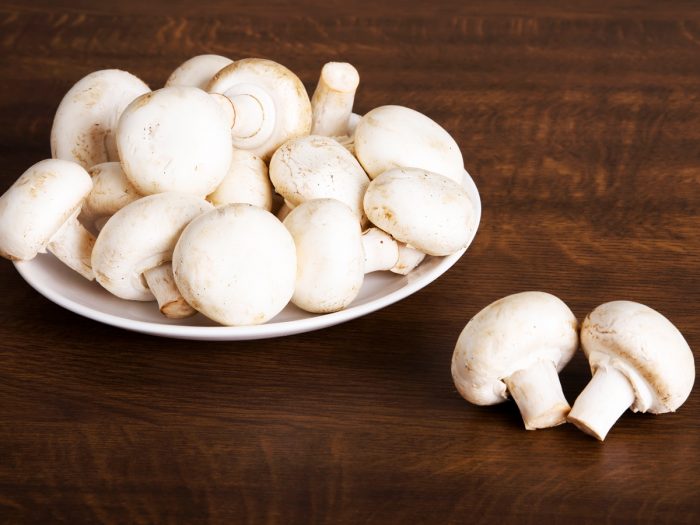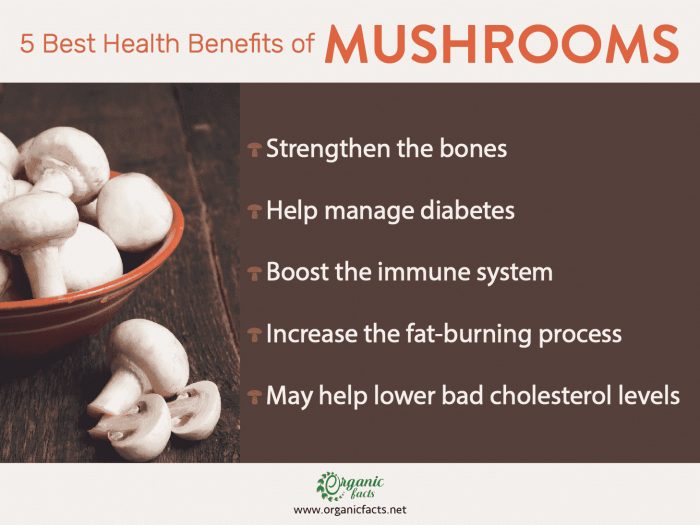Mushrooms are known for their nutritive value as they are potentially a good source of antioxidants, selenium, vitamins like vitamin B, and fiber. They are included in several weight management plans due to their low content of carbohydrates and calories. Mushrooms may also help reduce the risk of metabolic diseases, aid in weight loss, and improve cognitive health.
They take center stage in fairy-tales such as Alice in Wonderland; they are even featured in video games such as Super Mario Brothers where they make someone bigger in size or act as a shield against dangerous monsters. These aren’t just popular culture references, they are symbolic representations of the actual health benefits of mushrooms. Let us look at them in detail. [1]
What are Mushrooms?
Mushrooms are edible fungi with various scientific names; their family name is ‘Agaricus’. They are essentially saprophytes, the organisms (plants without chlorophyll) which thrive by extracting nutrients from dead and decaying plant and animal matter. They vary greatly in their color, texture, shape, and properties.

White button mushrooms are favored for their low calorie and low carb content. Photo Credit: Shutterstock
There are approximately 140,000 species of mushroom-forming fungi in the world. However, scientists are only familiar with about 10 percent, and only 100 species or so are being studied for their potential health benefits and medicinal applications. According to the Mushroom Council, popular edible mushrooms include: [2] [3]
- White button mushrooms
- Cremini mushrooms
- Portobello mushrooms
- Shiitake mushrooms
- Maitake mushrooms
- Enoki
- Oyster mushrooms
Some mushrooms are used medicinally or steeped to have mushroom coffee or mushroom tea such as reishi, chaga, and turkey tail mushrooms.
| Serving Size : | |
|---|---|
| Nutrient | Value |
| Water [g] | 92.45 |
| Energy | 22 |
| Energy [kJ] | 93 |
| Protein [g] | 3.09 |
| Total lipid (fat) [g] | 0.34 |
| Ash [g] | 0.85 |
| Carbohydrate, by difference [g] | 3.26 |
| Fiber, total dietary [g] | 1 |
| Sugars, total including NLEA [g] | 1.98 |
| Glucose (dextrose) [g] | 1.48 |
| Fructose [g] | 0.17 |
| Calcium, Ca [mg] | 3 |
| Iron, Fe [mg] | 0.5 |
| Magnesium, Mg [mg] | 9 |
| Phosphorus, P [mg] | 86 |
| Potassium, K [mg] | 318 |
| Sodium, Na [mg] | 5 |
| Zinc, Zn [mg] | 0.52 |
| Copper, Cu [mg] | 0.32 |
| Manganese, Mn [mg] | 0.05 |
| Selenium, Se [µg] | 9.3 |
| Vitamin C, total ascorbic acid [mg] | 2.1 |
| Thiamin [mg] | 0.08 |
| Riboflavin [mg] | 0.4 |
| Niacin [mg] | 3.61 |
| Pantothenic acid [mg] | 1.5 |
| Vitamin B-6 [mg] | 0.1 |
| Folate, total [µg] | 17 |
| Folate, food [µg] | 17 |
| Folate, DFE [µg] | 17 |
| Choline, total [mg] | 17.3 |
| Betaine [mg] | 9.4 |
| Vitamin B-12 [µg] | 0.04 |
| Vitamin E (alpha-tocopherol) [mg] | 0.01 |
| Tocopherol, beta [mg] | 0.01 |
| Tocopherol, gamma [mg] | 0.01 |
| Tocopherol, delta [mg] | 0.01 |
| Tocotrienol, alpha [mg] | 0.05 |
| Vitamin D (D2 + D3), International Units [IU] | 7 |
| Vitamin D (D2 + D3) [µg] | 0.2 |
| Vitamin D2 (ergocalciferol) [µg] | 0.2 |
| Vitamin K (Dihydrophylloquinone) [µg] | 1 |
| Fatty acids, total saturated [g] | 0.05 |
| 16:0 [g] | 0.04 |
| 18:0 [g] | 0.01 |
| Fatty acids, total polyunsaturated [g] | 0.16 |
| 18:2 [g] | 0.16 |
| Campesterol [mg] | 2 |
| Tryptophan [g] | 0.04 |
| Threonine [g] | 0.11 |
| Isoleucine [g] | 0.08 |
| Leucine [g] | 0.12 |
| Lysine [g] | 0.11 |
| Methionine [g] | 0.03 |
| Cystine [g] | 0.01 |
| Phenylalanine [g] | 0.09 |
| Tyrosine [g] | 0.04 |
| Valine [g] | 0.23 |
| Arginine [g] | 0.08 |
| Histidine [g] | 0.06 |
| Alanine [g] | 0.2 |
| Aspartic acid [g] | 0.2 |
| Glutamic acid [g] | 0.34 |
| Glycine [g] | 0.09 |
| Proline [g] | 0.08 |
| Serine [g] | 0.09 |
| Sources include : USDA [4] | |
Nutritional Value
Mushrooms are favored in weight loss diets as they are low-calorie and low-carb food. A cup of raw, white button mushrooms contains just 15.4 calories and 2 grams of carbohydrates. , They are also a good source of vitamins and minerals including vitamin C, B-vitamins (niacin, riboflavin, thiamin, folate), vitamin D, selenium, potassium, phosphorus, magnesium, and sodium. [5]
Health Benefits of Mushrooms
Let us look at the important benefits of mushrooms.
May Be Rich In Antioxidants
Mushrooms may have significant antioxidant properties due to their bioactive compounds, such as polyphenols, polysaccharides, vitamins, carotenoids, and minerals. A 2017 Penn State study suggested that mushrooms have an unusually high amount of two important antioxidants, ergothioneine and glutathione. [6] [7] [8]
Antioxidants can help rid the body of toxic free radicals and bring down oxidative stress levels, thus reducing the risk of neurodegenerative diseases. Researchers found that the amounts of ergothioneine and glutathione in mushrooms vary by species. Porcini, a wild variety, contains the highest amount of the two compounds among the 13 species tested by the researchers.
Also, mushrooms are one of the richest plant-sources of selenium, a vital antioxidant, but the content depends on the soil in which they are cultivated. [9]
Might Aid In Weight Management
Many varieties of mushroom like portobello have a meaty taste, making them a favored choice with vegetarians and vegans. Their low-calorie, low-carb content may also make them a preferred choice among people who are following the ketogenic diet or the paleo diet. A review published in 2008 studied the impact of substituting mushrooms for higher calorie food, beef, in a 4-day diet intervention for overweight or obese adults. While the volume of food was similar, the energy content of meat and mushroom lunches varied (783 calories versus 339 calories). While there were no differences in ratings of hunger, satiety, or palatability between the mushroom and meat weeks, the average daily calories and fat were lower with the mushroom meals. [10]
May Improve Cognitive Health
Researchers analyzed data from 663 people aged 60 and above from the Diet and Healthy Aging study in Singapore and found that people who ate mushrooms more than twice a week had reduced odds of having mild cognitive impairment. Also, an animal model study revealed that a bio compound in mushrooms called ergocalciferol may help protect the brain from beta-amyloid peptide toxicity. This may help in reducing the risk of Alzheimer’s disease. However, more detailed studies on humans are required to understand its therapeutic potential. [11] [12]

Mushrooms are a good source of antioxidants and B vitamins.
Other Potential Benefits of Mushrooms:
- Oral health: The results of a randomized controlled clinical trial with 30 participants suggested that a shiitake-extract oral mouth rinse, twice a day, may help reduce plaque. [13]
- Prebiotic source: In a 2013 study published in the Journal of Nutrition, researchers found that white button mushrooms may help in increasing microbial diversity and helped ease Citrobacter rodentium infection in mice. [14]
- Low-glycemic option for people with diabetes: The low cal and low-carb content in mushrooms might potentially make it a highly recommended food for diabetics.
Side Effects
Most species are not edible as they are highly poisonous and look strikingly similar to their edible counterparts. The other side effects of mushroom include the following:
- Some varieties contain psilocybin and psilocin, substances that can cause hallucinations. [15]
- A single poisonous mushroom among others in a dish can threaten a large number of people’s health, resulting in coma, severe poison symptoms, nausea, vomiting, convulsions, cramps, and insanity. [16]
- Many species of mushrooms can even prove to be fatal if ingested.
- Always avoid eating discolored ones or those which are different in color than the typically accepted color of their species.
How to Select & Store Mushrooms?
- Select fresh ones that have no discoloration or bruises.
- Always opt for sealed products from reputable companies or those in which you have grown yourself under controlled conditions after buying their seeds (spawns) from a trusted source. Do not trust any unknown vendors when you buy mushrooms.
- Don’t ever try picking them for consumption from the woods unless you have been trained to identify the variety. [17]
- Many mushrooms, when picked in the wild, contain heavy metals, as well as air and water pollutants, which can be very toxic.
- They have the unique ability to absorb the material that they grow on, either good or bad. This quality is what gives them so much of their nutritive qualities, but also may make them dangerous for health.
Store them in a paper bag or tea towel in a refrigerator or a cool place. Use them within a few days of purchase.
